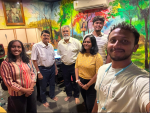By Lissy Maruthanakuzhy
Panaji, July 13, 2019: On July 3, we celebrated the feast of Saint Thomas, the Apostle of India.
The first reading of the day was from Jeremiah. “The word of the Lord came to me saying: Before I formed you in the womb I knew you, before you were born I set you apart, and I appointed you a prophet to the nations. Do not be afraid of them, for I am with you to protect you, declares the Lord.” (Jer 4-5, 9)
Every prophet had an experience with the Lord. The experience brought them a challenging mission and each took it up with courage.
Saint Thomas, one of the 12 disciples of Jesus, had the unique experience — touching the wound of Christ. The Gospel does not say if he actually touched the wounds, although Christ had invited him to have an experience of his wounds. The Lord who came into their middle with the assurance of “Peace be with you” called Thomas to touch and experience him.
A face-to face encounter — a heart to heart experience — with God changes a person completely. He or she takes a different direction, guided by the head and heart. We see this with the prophets and the people chosen by God in the Old Testament.
In the New Testament when Jesus called men from different walks of life to follow him, they left everything at once and followed him. The call changed them instantly.
Saint Paul experienced Jesus on his way to Damascus and he was a changed person since then. He immediately asked, “What am I to do Lord?”
Blessed James Alberione, the Founder of the Pauline Family had an experience in the night that divided the two centuries (1899-1900). He knelt before the Eucharistic Lord seeking guidance for his desire to serve the people of the new century. He wanted to make known Christ to many more people. He heard a voice within his heart, “Do not be afraid. I am with you. From here I want to enlighten. Live in continual conversion.”
From this experience the feeble teenager grew to be a gigantic figure in the Church introducing the media of communication for the evangelization of the masses. He founded five religious institutions and five secular institutions and the lay association of Pauline Cooperators.
In our own there are people who have took up challenging paths. Let us meet two of them:
Sister Betsy Devasia of Holy Cross Sisters of Chavanod heard the cry of the Lord on the eve of New Year in 1998. She and other nuns were preparing different dishes in the kitchen for the next day.
“I found some children playing in the compound outside the kitchen. They were from the poor neighborhood. Out of friendliness I called one of them close to me and asked, ‘What are you going to have for breakfast on New Year’s Day?’ The child’s answer left her speechless: “We had only some puffed rice today for breakfast. I do not know what we will have tomorrow.” The starving face began to haunt Sister Betsy.
Now, 20 years later, hundreds of women and men have become economically better because of Sister Betsy’s service through the Women’s Development Centre, Guwahati, the social service wing of the Holy Cross Sisters.
She has dedicated her life to bring positive changes in the lives of women so that they can maintain their family and live a decent life in society.
Similarly, Sister Lucy Kurian had a heartbreaking incident. She described the story of a young pregnant woman who came to her seeking shelter for the night from her husband, who wanted to bring home another woman.
“My superior was not home then and we had no place. So, I sent her back, promising to help her next day,” she said.
“The same night, I heard a cry and when I came out of the house I saw the same woman in flames. Her husband had doused her in kerosene and set her on fire. We took her to a hospital but could not save her. I requested the doctor if we could save the child. He brought me the charred little body.”
Devastated and angry with herself Sr Lucy searched for a way to help such hapless women. Maher (my mother’s home) she founded 22 year ago has helped more than 4,000 women to live in a safe home and find hope in life. It also cares for children, elderly men and women, and unwed mothers. They also care for HIV/AIDS-affected and their children.”
These are the Christ-bearers in our time. They are transformed in Christ. One has to be transformed in Christ to present him to the world. This is the secret of the efficiency and success of their mission. By caring, they also help humans to grow in God.
Pope Francis said, “For us consecrated persons, conversion to the newness of the Gospel entails a daily encounter with the Lord in prayer. The saints teach us that this is the source of all apostolic zeal. For religious, living the newness of the Gospel also means finding ever new in community life and community apostolates the incentive for an ever closer union with the Lord in perfect charity. For all of us, it means living lives that reflect the poverty of Christ, whose entire life was focused on doing the will of the Father and serving others.” (in Manila, January 2015)










